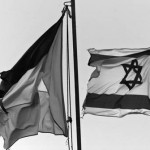Wednesday
Sep082010
Israel: Netanyahu's New Year Message "No Concession on Security & Jewish Identity"
 Wednesday, September 8, 2010 at 8:50
Wednesday, September 8, 2010 at 8:50  Prime Minister Benjamin Netanyahu celebrated Rosh Hashanah with a message on ongoing direct talks with Palestinians: "Lasting peace must be anchored in security and it must be anchored in the recognition of the Jewish state’s permanence in this region, not merely as a fact, but as something that our neighbors accept by right."
Prime Minister Benjamin Netanyahu celebrated Rosh Hashanah with a message on ongoing direct talks with Palestinians: "Lasting peace must be anchored in security and it must be anchored in the recognition of the Jewish state’s permanence in this region, not merely as a fact, but as something that our neighbors accept by right."Israel-Palestine: Israel’s Security Summit, Abbas and Netanyahu Clash on Core Issues
Video and Transcript: Obama’s New Year Message to Israelis
Transcript:
Dear Friends,
Sitting here in Jerusalem, the united capital of Israel, I want to wish Jewish communities around the world a Happy New Year – Shana Tova.
I hope it will be a year in which our people enjoy security, prosperity and peace.
Last year was one of the safest years in two decades.
But last week’s brutal murder of four Israelis, including a mother of six and a pregnant woman, reminds us that we must never take our security for granted.
We must continue a firm policy that makes clear that terror and missile attacks on our citizens will not be tolerated.
The past year has also seen a resurgence of the Israeli economy.
Israel has weathered the financial crisis better than nearly any other industrialized country.
Our economy is now firmly back on a robust path towards long-term growth. But of course we know that the crisis is not over and we shall act resolutely, decisively, but also carefully.
In the year ahead, my government will continue on the path of economic reform because a stronger economy means a stronger Israel.
The last few days have also seen a renewal of the peace process.
I had been calling for direct talks with the Palestinians for a year and a half.
I am pleased that President Abbas joined me in those talks without preconditions.
I believe that we should make every effort to reach an historic compromise for peace over the coming year.
I guarantee one thing. This will not be easy. But as Israel’s Prime Minister, it is my responsibility to make every effort to forge a lasting peace with our neighbors.
Lasting peace must be anchored in security and it must be anchored in the recognition of the Jewish state’s permanence in this region, not merely as a fact, but as something that our neighbors accept by right.
In the next year, Israel will face many challenges.
I have no doubt that in meeting those challenges, Jewish communities around the world will stand by Israel’s side – I think we've seen that every step of the way up to now. We'll see that every step of the way going forward.
May you all have a healthy and happy New Year. Shana Tova.
tagged  Benjamin Netanyahu,
Benjamin Netanyahu,  Israel,
Israel,  Palestine,
Palestine,  Rosh Hashanah in
Rosh Hashanah in  Middle East & Iran
Middle East & Iran
 Benjamin Netanyahu,
Benjamin Netanyahu,  Israel,
Israel,  Palestine,
Palestine,  Rosh Hashanah in
Rosh Hashanah in  Middle East & Iran
Middle East & Iran 



